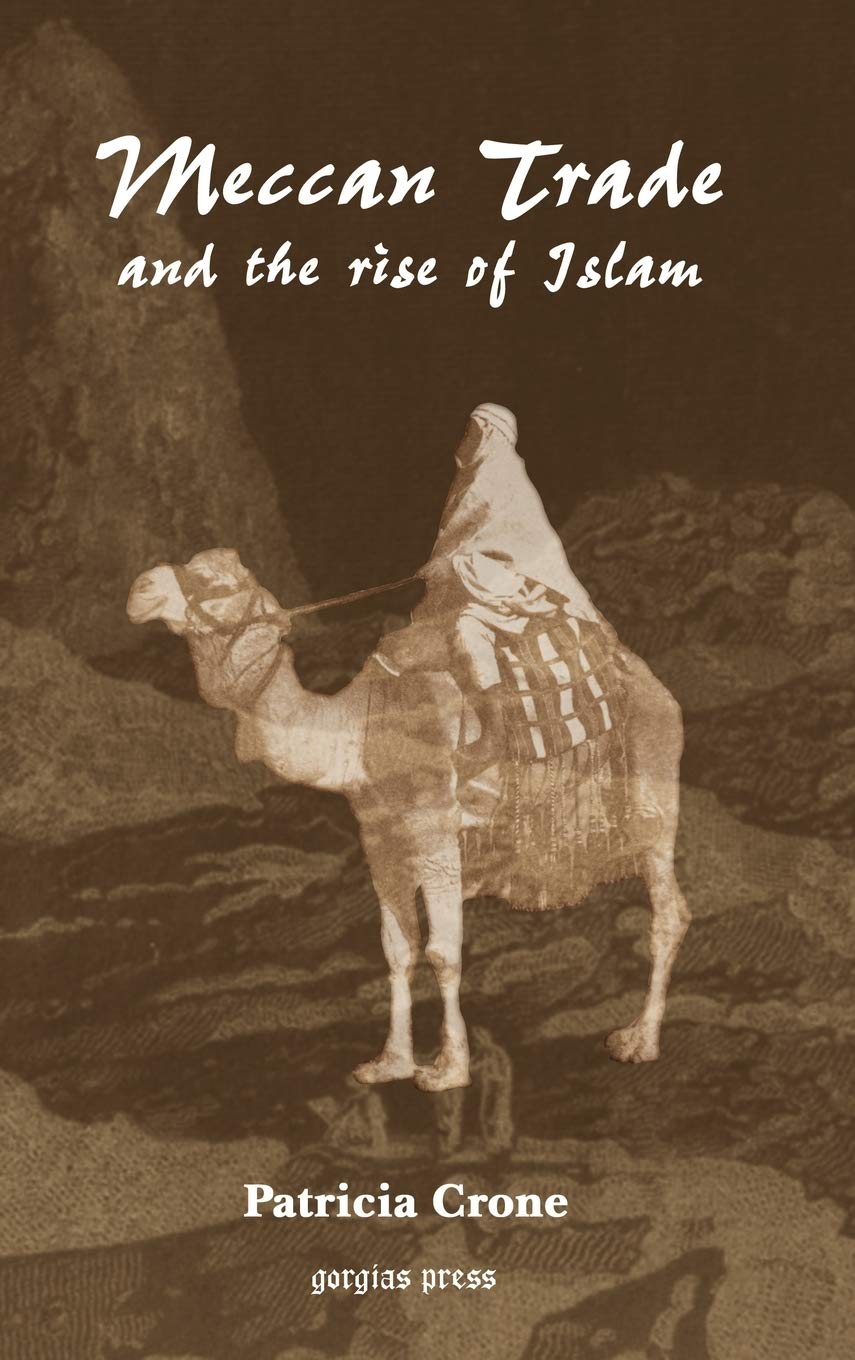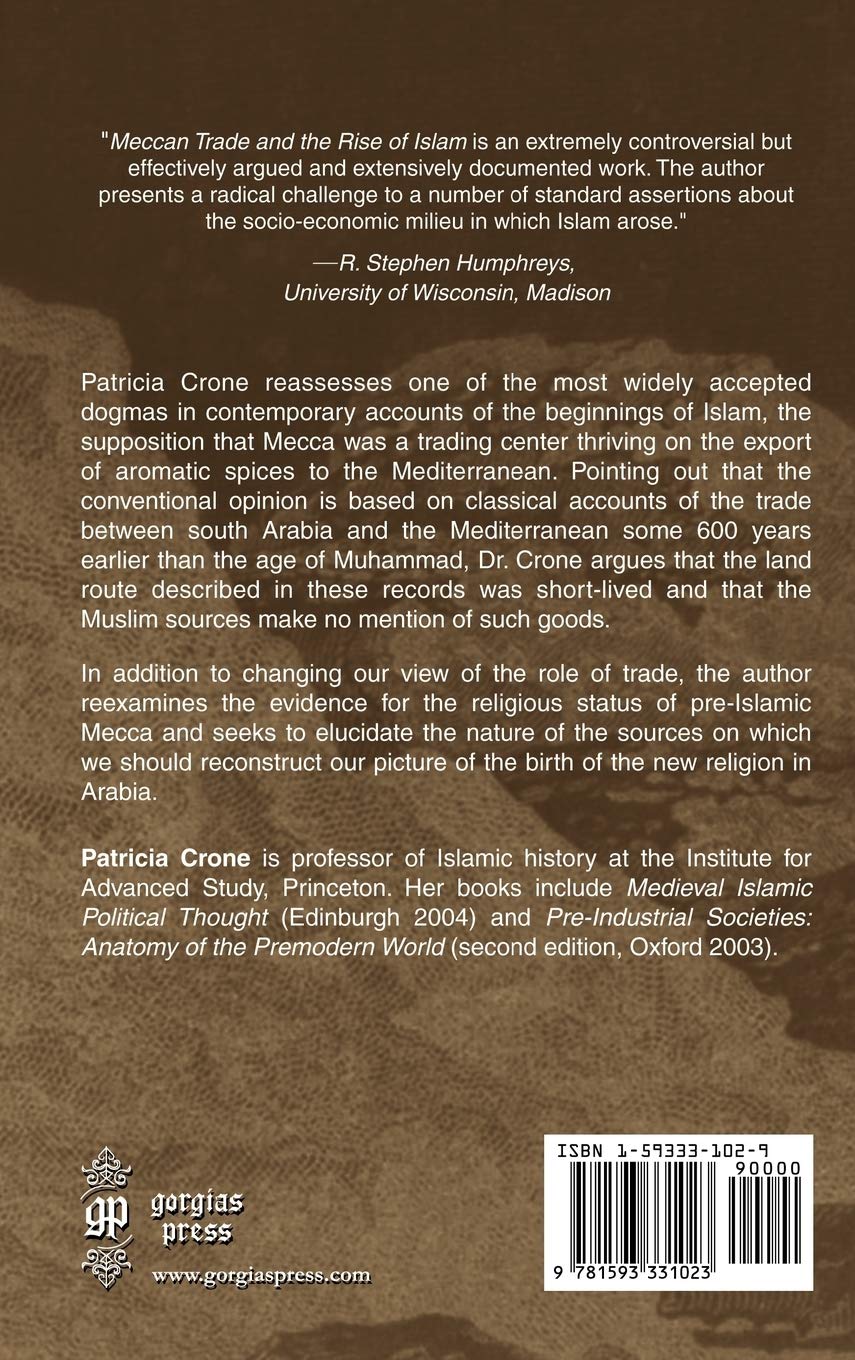Customer Services
Copyright © 2025 Desertcart Holdings Limited
Desert Online General Trading LLC
Dubai, United Arab Emirates




Full description not available
T**T
Real scholarship in a field that is often missing it
When I was a teenager I was always fascinated with the history of the rise of Islam. Looking at maps of Arabia and the location of Mecca, I always found it somewhat strange that Mecca should be located on a major trade route and that trade goods would pass through the desert on caravans that stopped at Mecca when it seemed that they could quite easily go by boat up the Red Sea. I had already studied the ancient Greeks and Phoenicians and was well aware that with the technology available, it was far cheaper to transport goods by sea than by land, so why would the Arabs not use the Red Sea to conduct their trade? At the time I just assumed that the experts must know why, perhaps the Red Sea was not navigable in the same way as the Mediterranean? Perhaps there were not enough natural harbors and that the currents are treacherous? Or there were just too many pirates. So I did not give it too much thought after that, assuming that the experts in the field simply understood why, though I never read any book that explained this curious anomaly. Twenty years later I came across the work of the skeptical school of early Islam who are beginning to question that a great trading center known as Mecca could have even existed in such an empty remote part of the desert not directly on a major trade route.Meccan Trade and the Rise of Islam is an incredibly detailed study of what pre-Islamic trade 'might' have been like. Crone explains that there are too many uncertainties and far too little written or archaeological data to draw any definite conclusions, but what we do know is that the traditional narrative about a prosperous trading city in the middle of the desert simply do not add up. Not only was Mecca located in a barren valley devoid of agriculture, but also not on any plausible ancient trade route. Trade with India and Africa was indeed conducted by sea, not land, so Mecca should really have been located on the coast. Furthermore Crone explains that there are no written records that mention a city called Mecca at all prior to the Rise of Islam. Crone explains that in the Islamic Era, the city of Mecca was only able to feed so many Muslim pilgrims because regular grain imports from Egypt were established, and these imports were brought in by boat via the Red Sea, not by land.The only drawback to this work is that it is perhaps too detailed and meticulous for the casual reader. There is a huge amount of detailed study on what trade goods the Arabs may or may not have traded in and Crone references many concepts that only well read Islamologists/Arabists will understand without explaining what they are.I would be very interested to read a well researched critique of Crone's thesis. The only one that I have found thus far is by R.B. Serjeant which can be read on Jstor here:[...]This critique is so pathetic that it only strengthens Crone's ideas. Serjeant begins with an ad hominem attack on Crone's character and what he perceives are her motivations, and then dedicates the rest of his critique to showing the reader that he knows more Arabic than her and then brags about all the times he has spent living with Bedouins in the desert without bothering to explain how any of that is relevant to what trade in Pre-Islamic Arabia might have been like. Surely someone in the field of primitive Islam must have written a better critique of this work? And if they haven't then why not?
C**R
Very well researched book. Maybe too detailed for the average reader.
$89 is awefully expensive. Very detailed booked. Patricia goes into great detail explaining why Mecca could not have been in the location it said to have been based on it's claims to be on a major trade route and was a large centre of commerce. She goes through every major spice and trade common to arabia at the time and the trade networks that existed. This may bore people, but it is critical to debunking the myth of Mecca.I have looked at maps and often wondered how Mecca was a major trading place, being in the desert with little resources, how could it have supported a major influx of foreign travellers. Look even at pictures from mecca from 100 years ago, it was nothing more than a dusty outpost, nothing like how the Quran describes it.
B**T
Outstanding Book - Extremely Poor Digitization
Excellent book by one of the best in early Islamic history. The book not only questions traditional views of early Islamic and pre-Islamic trade, but it looks analytically at alternatives and how they may or may not be correct. This is an excellent read for those who want to look beyond European stereotypes and consider what might actually have occurred given the limited contemporary documentation.I know though that Dr. Patricia Crone did not make the word and sentence errors occurring throughout the digitized version. In a few cases, the sentences are illegible, in others, the reader must slow down to take the time to understand what should have been printed but was not. In all, great book but horrible digitization effort (or lack thereof).
C**N
Mecca was not Dubai
Patricia Crone's book is cited in nearly every new book on Islam's origin. And After reading it I can tell why. The book examines the history of the trading routs in the region, mecca was in no way on a trading route. Then, the author review and question every item that was said to be traded by the meccans. the results are mostly negative. what mecca may have traded with others would in no way explain it's rise as a commercial city in the heart of the desert. In fact it's obvious , if such trade ever existed , that it was not an international trade but a local one, which again doesn't explain it's supposed wealth. This study , although a controversial one , remains unchallenged.
D**Y
Excellent Book
Well researched and well thought out. Raises a lot of questions and pokes even more holes in traditional understandings of the beginning of Islam. Only problem with the digital version is many formatting and spell problems. Still an outstanding study, well worth the time spent studying.
A**G
100% worth the money, dispelling the trade route myth ...
100% worth the money, dispelling the trade route myth that has been propagated by dishonest and lazy historians. Mecca was not even on a map until centuries after Muhammad's death, and certainly was not a center of trade. Patricia will be missed!
A**R
Trade of lies
A fantastic work! Should be a part of, not only High School student's studies, but also people who may be confused about the world it describes.
J**.
I was skeptical until this book made it clear to ...
I was skeptical until this book made it clear to me there might be a major part of the history missing for that region.
Trustpilot
5 days ago
2 months ago